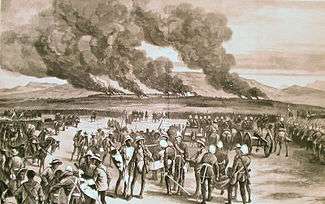Cecil D'Arcy
| Cecil D'Arcy | |
|---|---|
|
Ulundi burning | |
| Born |
11 August 1850 Wanganui, New Zealand |
| Died |
October 1881 (aged 31) Arnatola Forest |
| Buried at | King William's Town, Eastern Cape cemetery |
| Allegiance | Cape Colony |
| Service/branch | South African Forces |
| Rank | Captain |
| Unit | Cape Frontier Light Horse |
| Battles/wars | |
| Awards | Victoria Cross |
Captain Henry Cecil Dudgeon D'Arcy VC (11 August 1850 – October 1881) was a New Zealand recipient of the Victoria Cross, the highest and most prestigious award for gallantry in the face of the enemy that can be awarded to British and Commonwealth forces.
Details
D'Arcy, known as Cecil, was 28 years old, and a captain in the Frontier Light Horse, South African Forces during the Zulu War when the following deed took place for which he was awarded the VC.
On 3 July 1879 at Ulundi, South Africa, during a reconnaissance, Captain D'Arcy went to the rescue of Trooper Raubenheim of the Frontier Light Horse who had fallen from his horse as the troops were retiring. The captain waited for the man to mount behind him although the enemy were quite close, but the horse kicked them both off. Captain D'Arcy was hurt by the fall, and quite alone, but he still tried to lift the trooper, who was stunned, on to the horse, and only mounted and rode off when he was completely exhausted.[1]
Further information
He was born in Wanganui, New Zealand, where his father Major Oliver D’Arcy of the 65th Regiment was in the British garrison there (in 1860 Oliver transferred to the Cape Mounted Rifles and settled at King William's Town, Eastern Cape Colony).
Henry later joined the Cape Mounted Rifles as a captain, and served in the 1880 Basuto rising, but resigned in April 1881. He left the house of Rev. Taberer in the Cape Province where he was staying to recuperate during the night of 6–7 August 1881, and his remains were found next year[2] (though there were rumours that he had subsequently been seen elsewhere).
He is also considered South African, though he probably considered himself British or Anglo-Irish.
His story is told in the (out of print) book "What Happened to a V.C." by Patricia D'Arcy. ISBN 9780852210253
He is interred in the King William's Town, Eastern Cape cemetery.[3]
Controversy
The Independent newspaper in London reported that the Captain famously faked his own death. "No longer is anyone likely to imitate Captain Henry Cecil Dudgeon D'Arcy of the Frontier Light Horse, who, having been awarded the VC in the Zulu wars, turned to drink. Later, a body wearing his clothes was found in a cave and, this being the pathology of a century ago, presumed to be his. Only many decades later was it learnt that D'Arcy had found a dead man lying in the snow, changed clothes with him, and gone to Natal, and lived out the rest of his life under an assumed name. He was once recognised in 1925, but swore his discoverer to the secret, which the man kept until D'Arcy died. "
Bibliography
In the face of the Enemy: The complete history of the Victoria Cross and New Zealand by Glyn Harper & Colin Richardson (2006, HarperCollins, Auckland) ISBN 1-86950-522-0 (pages 55–56)
References
- ↑ The London Gazette: no. 24769. p. 5830. 10 October 1879. Retrieved 16 March 2009.
- ↑ "A Colonial Hero". Portland Guardian (Vic. : 1876–1953). Vic.: National Library of Australia. 24 January 1882. p. 2 Edition: MORNING. Retrieved 3 October 2013.
- ↑ "Find a Grave". Find a Grave. Retrieved 2 January 2012.
External links
- New Zealand Troops who have won the Victoria Cross at the Wayback Machine (archived 26 October 2009) (brief biography details)
